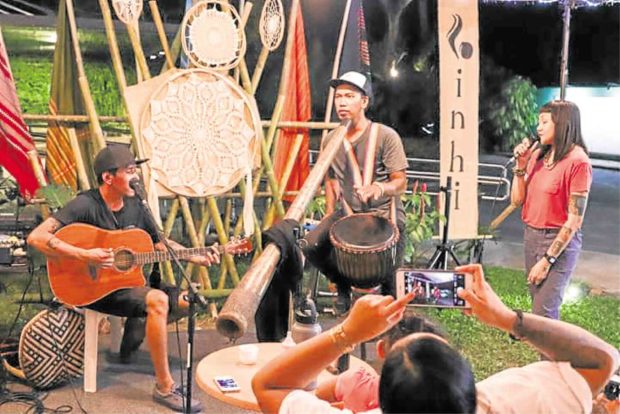
FAMILY-FRIENDLY SPOT Binhi Mindful Market, set up on special occasions in Puerto Princesa City, is a family-friendly destination offering organic food, wellness products, artworks and crafts, with musical performances by homegrown talents. —PHOTOS BY SAM LODOR / CONTRIBUTOR
PUERTO PRINCESA CITY, Palawan, Philippines — On special occasions like Mother’s Day and Father’s Day, the garden of a hotel in front of Puerto Princesa International Airport here is transformed into a pocket marketplace for local products.
Binhi Mindful Market, run by a community of farmers, handicraft makers, artists and entrepreneurs, is set up at a roughly 150-square-meter space beside Canvas Boutique Hotel along the national highway at Barangay San Miguel.
It is no ordinary market as this was borne out of an idea to promote clean and green living.
From fresh produce to natural personal care products made from raw honey, homemade chili sauce, crocheted crafts, homemade cheese and yogurt and tools to lessen waste, Binhi has a wide range of merchants showcasing their products—all handmade, natural and eco-friendly.
“Binhi,” in Filipino, means seed or sprout. Conceptualized by Gia Querubin last year, Binhi is a conscious and mindful shopping experience in the form of a pop-up market.
“With the influx of tourists, both Filipinos and foreigners, I feel it necessary for the local community of Palaweños to strengthen their efforts and drive to protect the environment. This is one of the things I hope Binhi will be able to develop,” says Querubin, who left a corporate job in Manila to settle in Palawan in 2016.
Binhi aims to strengthen the zero-waste movement by promoting plastic-free shopping. It advocates a healthy and sustainable lifestyle through conscious consumerism and entrepreneurship, Querubin says.
The market features products grown and made in Palawan. Merchants are encouraged to explore products from the province to lessen transport expenses and to sustain traditional crafts and methods.
Organic farms
The market, featuring products from more than 20 merchants, is exclusively for organic farmers, giving them the opportunity to sell their produce at fair and reasonable prices.
Querubin says business and restaurant owners are also given an opportunity to scout for new suppliers. “There are merchants who were able to close long-term business deals and partnerships through Binhi,” she says.
Among the major challenges facing organic farmers in Palawan is the lack of awareness of consumers on organic farming methods—the time and effort invested in producing crops versus conventional farming.
BINHI FINDS Bamboo craft by Etnikustik, chili garlic by Maldita Fiery Foods and a painting using foraged plants by Lala Magbuhat.
Bryan Dizon, owner of Javenri Harvest Farm, says Binhi gave farmers a direct link to buyers.
“Weekend markets such as Binhi enabled locals and tourists in Puerto Princesa to see that we have a rich source of products to offer,” Dizon says, noting that small merchants could not afford the rent in commercial spaces.
“Our naturally grown products have a price difference as we look into other ways to avoid unnatural farming practices. Binhi promotes clean food, free from pesticides and antibiotics. [Through Binhi], I feel that my advocacy in natural farming and growing one’s own food [is supported],” he adds.
Workshops
Binhi conducts workshops that children and adults will enjoy. During market days, community members hold learning sessions on basic calligraphy, crochet, embroidery, natural tie-dye and music.
HOME The garden of Canvas Boutique Hotel is home to Binhi where merchants link up with potential business partners.
Querubin says Binhi has linked up with other organizations to push environmental advocacy and projects, like preservation of heirloom seeds, local crafts and traditions. It also helps Palaweño entrepreneurs to explore business opportunities with local hotels and establishments.
In January, Binhi represented the Philippines during the Asean-Japan Women Entrepreneurs’ Linkage Program (AJWELP) in Malaysia. Querubin, during the program, presented the concept and advocacy of Binhi to companies and government organizations from Southeast Asian countries and Japan, which led to partnership opportunities.
“Since AJWELP, the concept has evolved more than just the shopping experience. Eventually, we want to be the go-to support center for small merchants who wish to develop their brands the ‘sustainable’ and ‘mindful’ route,” Querubin tells the Inquirer.
AJWELP, she says, opened doors for Binhi to introduce Palawan products to an international market.
“In the next months, as we grow Binhi and focus on [realizing] the next phase in its growth plans, there will be more indicators of success, such as the number of communities we get to tap through outreach activities, partner establishments for Binhi pop-up shops, and more,” she says.